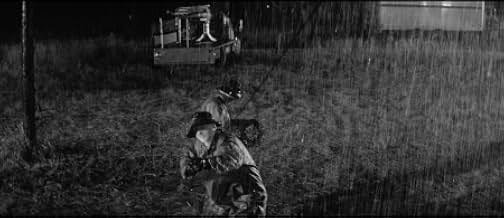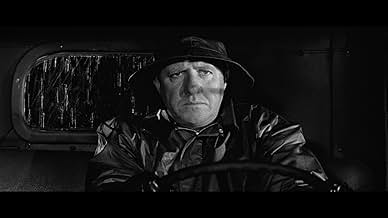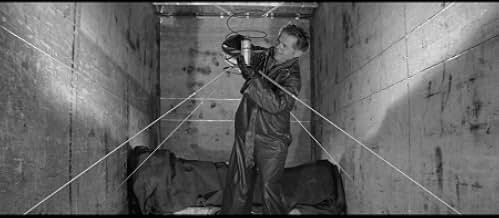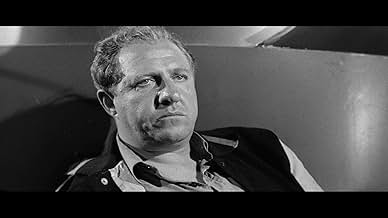Five men rob a train in Utah of 10 million dollars in gold and head to Los Angeles in 3 trucks hoping to meet up with their beautiful accomplice and leave the country.Five men rob a train in Utah of 10 million dollars in gold and head to Los Angeles in 3 trucks hoping to meet up with their beautiful accomplice and leave the country.Five men rob a train in Utah of 10 million dollars in gold and head to Los Angeles in 3 trucks hoping to meet up with their beautiful accomplice and leave the country.
- Trooper No. 2
- (as Charles Conrad)
- Narrator
- (uncredited)
Featured reviews
Still, it's no problem for this little gem. The remaining time amounts to a real nail-biter in getting away with the gold now that the gang has stolen it. Driving big rigs cross-country is cat-and-mouse with the cops the whole way, as details of the plan unfold, and we get acquainted with the gang members.
Raymond's effective as the disciplined mastermind. I think I counted one smile from him the whole time. Then there's the familiar mug of professional loser Cook Jr. who gets a regular guy role for once. And, of course, there's the underrated Wayne Morris as the dependable Commando, just two years away from an untimely passing.
My one gripe is with the tip-offs to the cops. They're flimsy and contrived, especially the police radio in Roly's (Repp) case. Too bad, because the rest of a tight script manages a surprisingly high degree of believability, thanks to screenwriter Steven Ritch who doubles here as race car guy Frankie.
I expect director Cornfield was hoping for a break-through film on the order of the previous year's The Killing (1956), which thrust Stanley Kubrick into the front rank. He doesn't get it, but he does get one heckuva good little heist film, and so do we. And, oh yes, I could have told the gang to stay off the LA freeways at rush hour.
It's a decently done B movie, with some nice talent in front of the camera and behind it, too; Ernest Haller runs a nice camera, with an increasingly filled and claustrophobic screen. A little too much time is spent in chat, but what are you going to do when you're driving a truck several thousand miles, and the voice on the radio is always the same?
Once again, I am impressed by Gene Raymond, whom I had once written off as a pretty-boy actor from the 1930s. This was Wayne Morris' last movie shoot; one he had shot earlier sat on the shelves for a few years.
Gene Raymond and Elisha Cook Jr. are known actors to classic film buffs but the rest of the cast may not be too familiar. There is no one star in this film anyway but all give good performances, particularly Raymond, the most interesting member of the gang.
The weak link of the film, at least to me, was the ending...but I give it points for originality. Overall, the story was a simple one, but oddly told. I say that because the important things that happened in the film (the arrests of the criminals, for one thing) would be glossed over quickly while minor things would be detailed longer than necessary. Despite that, the film was interesting thanks to good dialog, realism on the part of the characters and the short running time (73 minutes). Hope to see it on DVD some day.
Did you know
- TriviaFinal cinema film of Wayne Morris (I). NOTE: He appeared in Buffalo Gun (1961), which was released in 1961, but it was shot in 1957, before this film. For the remainder of his career he appeared on television.
- GoofsThe trucks are fitted with California registration plates all along the 500 miles they travel. California plates with arouse immediate suspicion with the police in roadblocks in all the states they had to pass.
- Quotes
Eddie Harris: [Commando and Frankie laugh after pulling off the heist] Before we start congratulating ourselves let's remember we've still got 900 miles to go, 900 miles to every cop between here and the coast, and you laugh it up like a couple of clowns.
- Alternate versionsThe original release included narration by Michael Fox, Douglas Bank and Stacy Graham which was later removed.
- ConnectionsFeatured in A Night at the Movies: Cops & Robbers and Crime Writers (2013)
- How long is Plunder Road?Powered by Alexa
Details
- Release date
- Country of origin
- Languages
- Also known as
- Plunder Road
- Filming locations
- Kling Studios, Hollywood, Los Angeles, California, USA(Studio. This was formerly the Charlie Chaplin Studios.)
- Production company
- See more company credits at IMDbPro
- Runtime
- 1h 12m(72 min)
- Color
- Aspect ratio
- 2.35 : 1




















